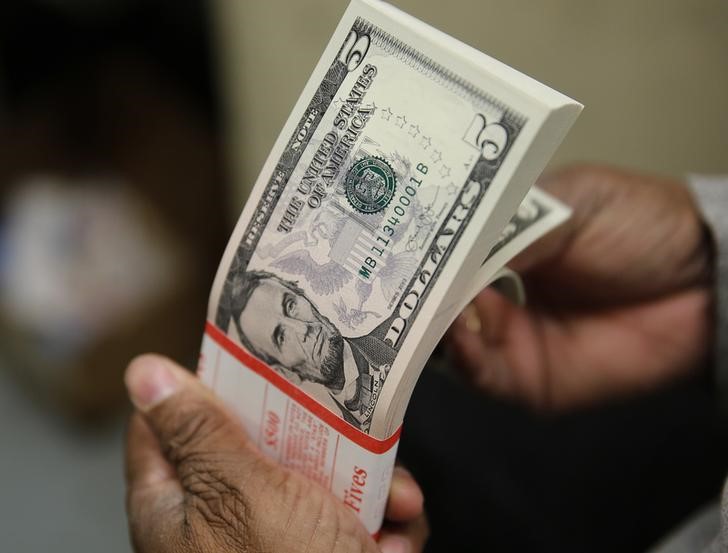Hulk Hogan, wrestling icon, dies at 71 in Florida home
* Dollar index close to three-week lows
* China's yuan drops after central bank lowers reserve
requirement
* Riskier currencies stabilise
* Graphic: World FX rates in 2020 https://tmsnrt.rs/2RBWI5E
(Updates prices)
By Elizabeth Howcroft
LONDON, Oct 12 (Reuters) - China's yuan fell on Monday after
the People's Bank of China (PBOC) changed its reserve
requirements policy, a move seen as a bid to curb recent yuan
appreciation, while the dollar index rose off three-week lows on
hopes for fiscal stimulus.
The onshore and offshore yuan both fell 0.8% against the
dollar after China's central bank said on Saturday that it would
lower the reserve requirement ratio for financial institutions
when conducting some foreign exchange forwards trading.
The yuan had reached a 17-month high on Friday in both
onshore and offshore trade. It has gained around 6% against the
dollar since late May, driven by a favourable yield differential
between China and other major economies.
But on Monday the offshore yuan was on track for its biggest
daily decline against the dollar since March, changing hands at
6.7429 at 1158 GMT CNH=EBS .
"It's probably people covering long China positions," said
Neil Jones, head of FX sales at Mizuho. "There's an element of
liquidating long China positions because globally the market
generally has been quite upbeat on China."
The PBOC's move to end the requirement for banks to set
aside cash to cover yuan forward transactions would make it
easier to short the yuan, said RBC's head of Asia FX, Alvin Tan.
"This is being interpreted as a subtle signal from the PBOC
to restrain the speed of the yuan's rise, but how much of a
restraint will become clearer with the upcoming daily fixings,"
Tan said.
HSBC strategists wrote in a note to clients that the policy
change was unlikely to reverse the downward trend in
dollar-yuan. Goldman Sachs strategists also wrote that they
continue to expect a stronger yuan, citing solid Chinese growth
and favourable interest rate differentials with the United
States.
The move was also cited by analysts as a reason for weakness
in the China-sensitive Australian dollar, which was down 0.4% on
the day at 0.7212 at 1200 GMT.
The New Zealand dollar was down 0.4% at 0.6647 NZD=D3 .
The U.S. dollar index was up 0.1. The dollar had its biggest
loss in six weeks on Friday, when investors upped their bets
that a fiscal stimulus package would be agreed to mitigate the
economic fallout from COVID-19. The Trump administration called on Congress to pass a
stripped-down version of the relief bill on Sunday, while
negotiations on a broader package continue. The dollar has been buffeted by the on-again, off-again
stimulus negotiations. Now, with Nov. 3 election only weeks
away, investors are betting that Democrat Joe Biden is more
likely to win the U.S. presidency and offer a larger economic
package. "Any negative fallout from a failure to reach a fiscal deal
before the election will be dampened by expectations for even
bigger stimulus after the election," MUFG currency analyst Lee
Hardman wrote in a note to clients.
"Market participants remain optimistic over a Blue Wave," he
added, citing polling data which shows a Biden lead.
The dollar index was at 93.187 at 1201 GMT, up 0.1% on the
day and having almost completely reversed its recovery at the
end of September =USD .
The euro was down 0.3% on the day at $1.17955 EUR=EBS . In
Europe, the World Health Organization has urged governments to
restrict activity to combat a rapid rise in COVID-19 infections.
Speculators cut their euro long positions to a two-month low
in the week to Oct. 6, weekly CFTC data showed 1099741NNET .
The yen was up 0.2% against the dollar at 105.435 JPY=EBS .
The safe-haven Swiss franc was up 0.2% against the euro at
1.07395 EURCHF=EBS .
The pound held above $1.30, before new lockdown measures
GBP=D3 . <^^^^^^^^^^^^^^^^^^^^^^^^^^^^^^^^^^^^^^^^^^^^^^^^^^^^^^^^^^^
Dollar-yuan https://tmsnrt.rs/3jPC2W4
^^^^^^^^^^^^^^^^^^^^^^^^^^^^^^^^^^^^^^^^^^^^^^^^^^^^^^^^^^^>
